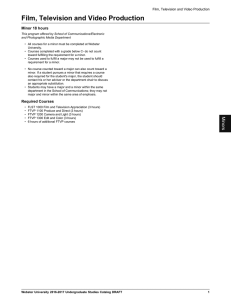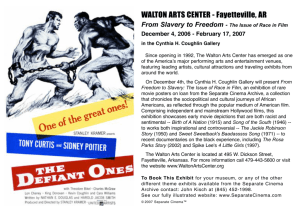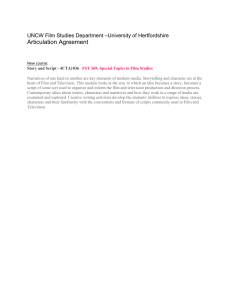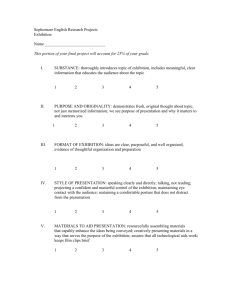2014—15 Research Newsletter Department of Film and Television Studies
advertisement
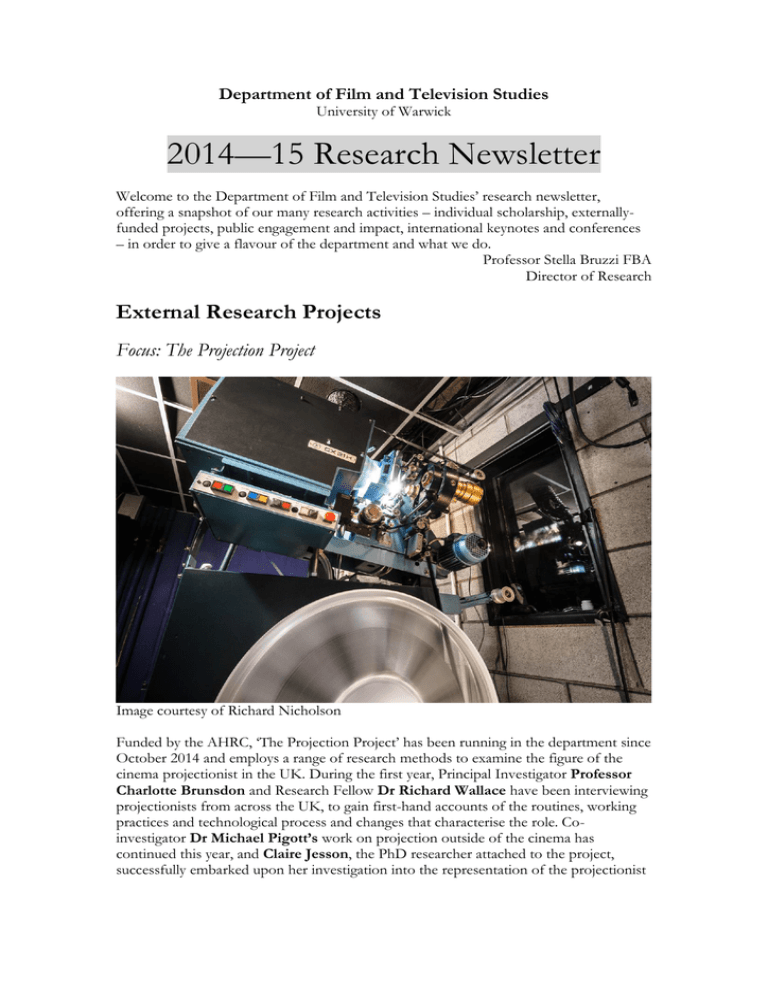
Department of Film and Television Studies
University of Warwick
2014—15 Research Newsletter
Welcome to the Department of Film and Television Studies’ research newsletter,
offering a snapshot of our many research activities – individual scholarship, externallyfunded projects, public engagement and impact, international keynotes and conferences
– in order to give a flavour of the department and what we do.
Professor Stella Bruzzi FBA
Director of Research
External Research Projects
Focus: The Projection Project
Image courtesy of Richard Nicholson
Funded by the AHRC, ‘The Projection Project’ has been running in the department since
October 2014 and employs a range of research methods to examine the figure of the
cinema projectionist in the UK. During the first year, Principal Investigator Professor
Charlotte Brunsdon and Research Fellow Dr Richard Wallace have been interviewing
projectionists from across the UK, to gain first-hand accounts of the routines, working
practices and technological process and changes that characterise the role. Coinvestigator Dr Michael Pigott’s work on projection outside of the cinema has
continued this year, and Claire Jesson, the PhD researcher attached to the project,
successfully embarked upon her investigation into the representation of the projectionist
in cinema. Dr Jon Burrows will begin work on a programme of archival research in
October 2015, when he returns from sabbatical leave.
The team has also developed public engagement activities with our project partners, Ian
Francis at Flatpack Film Festival and photographer Richard Nicholson. A display
combining Richard’s photographs of projectionists with material taken from the
interviews will form part of Flatpack’s Festival in March 2016.
Our research has been presented by various members of the team at the HoMER
(History of Moviegoing, Exhibition and Reception) Conference at the University of
Glasgow, at the University of Sunderland, and at the Oral History Society Annual
Conference at Royal Holloway, University of London.
Individual Scholarship
Focus: Dr Rachel Moseley
Rachel Moseley had a productive and successful term of research leave in Spring Term
2015, during which she researched and wrote a book for Palgrave Macmillan that
analyses and theorises children's stop-frame animated television in Britain in the 60s and
70s; there is no existing scholarship in this area. The case studies are Smallfilms, Gordon
Murray Puppets and FilmFair. The preparation involved reading, viewing and archival
research trips to the BBC Written Archives Centre in Caversham, and the manuscript
was submitted at the end of September 2015, to appear in the Palgrave Pivot series with
the provisional title of Hand-Crafted Television: Stop-Frame Animation for Children in
Britain, 1961-1974.
Rachel also delivered two conference papers related to the research:
April 2015, Television Drama: The Lost, The Neglected and the Forgotten Conference,
Royal Holloway University of London: 'The Art of Child's Play: The Forgetting (and
Remembering) of Stop-Motion Animation for Children'
July 2015, The Story of Children's Television Conference, University of Warwick:
'Ontologies of Stop-Frame Animation: The Case of Smallfilms'.
Focus: Dr Karl Schoonover
Karl Schoonover is completing a ground-breaking book entitled Cinema and the Matter of
Waste: Postwar Film in a Petrochemical World, in which he proposes that cinema raised the
problem of excess waste long before the popular environmentalism of the late 20th
Century. Combining archival documents, close textual analysis and recent philosophy,
the project documents how various forms of refuse and pollution haunt Hollywood,
experimental and documentary films in the three decades after WWII, a period of US
history otherwise remembered for its unprecedented economic prosperity. In ways that
later ecologically-minded films seem unable to express, mid-twentieth-century films
capture modern culture's abiding apprehension about how a world dominated by waste
and its toxicity endangers human relations, the lived environment and political
sovereignty. He has been invited to give lectures from this project at the University of
Oxford, the University of Cambridge, Kings College London, and the University of
York.
In a recent article related to this project, Schoonover describes how climate change
documentaries struggle when depicting toxins visually. http://www.necsusejms.org/documentaries-without-documents-ecocinema-and-the-toxic/
Focus: Professor Stella Bruzzi
Stella Bruzzi was visiting professor at Masaryk University, Brno in the Czech Republic
during April 2015, during which time she delivered several lectures and seminars related
to her research, including classes on Jackie Kennedy’s pink suit, Clio Barnard’s
documentary The Arbor and masculinity and mise-en-scene in contemporary Hollywood.
She also participated in a roundtable discussion on ethics at Chapman University,
California and was invited to speak and run 1:1 workshops with practice students at Piet
Zwart Institute, Rotterdam.
Public Engagement and Impact
Focus: 'The Story of Children's Television, 1946 to Today', Exhibition at
The Herbert Museum and Art Gallery, Coventry (May to September, 2015)
Researchers: Dr Helen Wheatley and Dr Rachel Moseley.
The exhibition was designed to bring generations of families and friendship groups
together to think about the history of children's television. The exhibition remained
extremely popular throughout the run, and has broken all the Herbert's previous
attendance records. This speaks very clearly to the potential of collaboration between
industry and academia, and the exhibition has been nominated in two categories of the
Coventry and Warwickshire Culture and Tourism Awards ('The Culture Award' and 'The
Best Tourism Event of the Year Award'). The exhibition will go on to tour the UK for
two and half years, following the run in Coventry. The exhibition has been a triumph for
the Museum and for the department, and there is evidence of substantial levels of public
engagement and impact from visitors’ books, comments cards and drawings gathered in
Coventry. Plans are in train to write and publish an article based on the collated
exhibition data.
Various subsidiary activities have run throughout, like write a 'pub quiz' on children's
television for the museum to use at a 'Museums at Night' event. Rachel Moseley wrote a
piece on the exhibition for the BBC magazine Broadcast. Helen Wheatley did a huge
amount of television and radio publicity around the launch of the exhibition in May,
which attracted key industry figures who spoke at the launch event, including Kay
Benbow (Controller, CBeebies) and Greg Childs (Children's Media Foundation). There
was a major international academic conference around the exhibition in July, held mainly
at Warwick but with a panel and reception at the Herbert. The panel was invited key
industry figures from children's television past and present, talking about the importance
of history for current and future production, and about the challenges facing future
production (e.g. Estelle Hughes, Exec. Prod. Thunderbirds are Go!, Sara Harkins, BBC
Children's Scotland).
We have conducted fieldwork, designed by Amy Holdsworth (a graduate of the
Warwick PhD programme), observing visitors' interactions with the exhibition and with
each other, and speaking to people who came to a series of 'Square Eyes' Screenings run
by Helen at EGO performance Space in Coventry which have been co-ordinated with
the exhibition. Helen was awarded some Impact money by the university, which was
used to enable graduate researchers to conduct some demographic research with visitors
to the exhibition.
Focus: Individual Activity
In September 2015 Professor Stella Bruzzi chaired a lively Q&A after the Stratfordupon-Avon Picturehouse screening of the new documentary, The Best of Enemies
(Morgan Neville, Robert Gordon, 2015). It’s hoped that this will be the first of many
collaborations with the Picturehouse.
Dr Rachel Moseley wrote two pieces for The Conversation this year (one co-written with
Gemma Goodman in English). With 42,000 readers in total, this has proved a
worthwhile and interesting way of disseminating and demonstrating the impact of our
research. Rachel’s articles are:
'Why academics are interested in the male body in Poldark and Outlander', The
Conversation, (2 June, 2015) https://theconversation.com/why-academics-areinterested-in-the-male-body-in-poldark-and-outlander-42518;
'An Alternative Femininity: Beyond the Enduring Appeal of Audrey Hepburn', The
Conversation (6 July, 2015) https://theconversation.com/an-alternative-femininitybehind-the-enduring-appeal-of-audrey-hepburn-44213
Jose Arroyo returned to the Escuela Internacional de Cine y Television in Cuba, recently
voted one of the top 5 filmmaking schools to watch in The Hollywood Reporter.
The school was founded in 1986 by Nobel Laureate Gabriel García Márquez, Argentine
poet Fernando Birri and the Cuban producer Julio García Espinosa with the support of
then-President Fidel Castro in order to provide as close to an ideal context for students
from the ‘Three Worlds’ of Africa, Asia and Latin America to study filmmaking. The
three founders dreamed up an ingenious system of workshop-based teaching where
directors, sound men, cinematographers, critics, academics and just about anyone
involved with any aspect of film culture arrive for a two week period, teach what they
know, and then the same mini-bus that returns them to the airport brings in a new set of
skilled people willing to share their knowledge. It’s a very effective system and one
available now to students from ‘Todos los mundos’/ All the worlds.’ Arroyo was
honoured to have been invited to lecture on The Cinema of Ernst Lubitsch’ and on ‘The
Musical’.
New Department Research Centre
Focus: The Centre for Television History, Heritage and Memory Research
https://www2.warwick.ac.uk/fac/arts/film/cthhmr/
The aims of this newly formed Centre focus on television history, heritage and memory
and the development of research, learning and training, and engagement, impact and
collaboration with industry.
The Centre was ratified by Senate at the beginning of the year and will be launched
officially in October 2015, with a lecture by Professor Christine Geraghty on Television
History and Memory, and a short speech by an industry partner (either Tony Ageh, BBC
Archives or Iain Logie-Baird, Bradford Media Museum) and a drinks reception.
Indicative of the considerable interest and support across the university is the Centre’s
growing interdisciplinary membership (see website). The Centre, closely affiliated to the
Centre for Cultural Policy Studies, will provide the perfect framework within which to
develop the department's connections with scholars inside and outside the university and
the home field, and with industry partners who might collaborate with us, eventually, in
providing unique opportunities for training and industry experience for our students,
thus aiding recruitment. The Centre is partnered with the Connecting Cultures GRP and
is collaborating with colleagues at Warwick working on memory studies more generally.
There are a number of research funding bids in preparation, including: a CDA with the
ITV Archives; a research network; a project on representations of gypsies, roamers, and
travellers.
Forthcoming Department International Conference
Focus: Rome, Open City: Examining the legacy after seventy years
https://www2.warwick.ac.uk/fac/arts/film/news/romeopencity
Thursday 12 November - Friday 13 November 2015
Organised by Louis Bayman, Stephen Gundle, Karl Schoonover
The release of Roberto Rossellini’s Rome, Open City in September 1945, just months after
the Liberation of Italy, is a landmark in both cinema and Italian history. The film’s tale of
popular resistance in Nazi-occupied Rome brought Italy to international audiences. It
announced a new aesthetics of cinema - neorealism - that would have a global impact,
attracting attention and often controversy for its bold assertion of the necessary
relationship between art and politics. The film is a central reference point for cinematic
realism and aesthetic radicalism, influencing movements from the French New Wave to
Brazilian Cinema Novo, British social realism and Dogme 95. It remains a key influence
for contemporary filmmakers as well as an important reference point in areas as diverse
as cultural geography, gender studies, performance, historiography, aesthetic philosophy,
and the study of war, fascism and torture.
Keynote speaker: David Forgacs,
Guido and Mariuccia Zerilli-Marimò Chair in Contemporary Italian Studies, NYU
Additional confirmed speakers include:
Stella Bruzzi, University of Warwick, UK
Emiliano Morreale, Director of the Cineteca Nazionale, Rome, University of Turin
Sergio Rigoletto, University of Oregon, USA
Vanessa Roghi, La Sapienza, Rome, Italy
Maurizio Viano, Wellesley College, USA
Co-sponsored by
For a more comprehensive list of our recent publications and all our research-related
events, see the News section of our website:
https://www2.warwick.ac.uk/fac/arts/film/news/.

